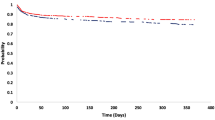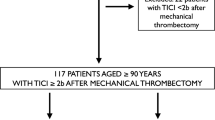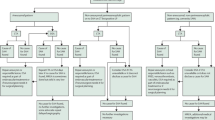Abstract
The space-occupying so-called “malignant” middle cerebral artery infarction is—besides acute basilar artery occlusion—the most devastating form of ischemic stroke. Until recently, there was no proven treatment. In 2007, results from randomized controlled trials provided evidence for the benefit of early hemicraniectomy with respect to mortality after 3 months. This review focuses on current treatment options for malignant ischemic brain infarction, especially hemicraniectomy. Moreover, major unsolved problems and open questions regarding the disease are discussed, and perspective is given on future clinical studies.
Similar content being viewed by others
References and Recommended Reading
Hacke W, Schwab S, Horn M, et al.: ’Malignant’ middle cerebral artery territory infarction: clinical course and prognostic signs. Arch Neurol 1996, 53:309–315.
Berrouschot J, Sterker M, Bettin S, et al.: Mortality of space-occupying (’malignant’) middle cerebral artery infarction under conservative intensive care. Intensive Care Med 1998, 24:620–623.
Kasner SE, Demchuk AM, Berrouschot J, et al.: Predictors of fatal brain edema in massive hemispheric ischemic stroke. Stroke 2001, 32:2117–2123.
Ropper AH, Shafran B: Brain edema after stroke. Clinical syndrome and intracranial pressure. Arch Neurol 1984, 41:26–29.
Wijdicks EF, Diringer MN: Middle cerebral artery territory infarction and early brain swelling: progression and effect of age on outcome. Mayo Clin Proc 1998, 73:829–836.
Hofmeijer J, van der Worp HB, Kappelle LJ: Treatment of space-occupying cerebral infarction. Crit Care Med 2003, 31:617–625.
Bardutzky J, Schwab S: Antiedema therapy in ischemic stroke. Stroke 2007, 38:3084–3094.
Juttler E, Schellinger PD, Aschoff A, et al.: Clinical review: therapy for refractory intracranial hypertension in ischaemic stroke. Crit Care 2007, 11:231.
Schwab S, Schwarz S, Spranger M, et al.: Moderate hypothermia in the treatment of patients with severe middle cerebral artery infarction. Stroke 1998, 29:2461–2466.
Greco T: Le thrombosi posttraumatiche della carotide. Arch Ital Chir 1935, 39:757–784.
Carandang RA, Krieger DW: Decompressive hemicraniectomy and durotomy for malignant middle cerebral artery infarction. Neurocrit Care 2008, 8:286–289.
Foerch C, Lang JM, Krause J, et al.: Functional impairment, disability, and quality of life outcome after decompressive hemicraniectomy in malignant middle cerebral artery infarction. J Neurosurg 2004, 101:248–254.
Gupta R, Connolly ES, Mayer S, Elkind MS: Hemicraniectomy for massive middle cerebral artery territory infarction: a systematic review. Stroke 2004, 35:539–543.
Vahedi K, Hofmeijer J, Juettler E, et al.: Early decompressive surgery in malignant infarction of the middle cerebral artery: a pooled analysis of three randomised controlled trials. Lancet Neurol 2007, 6:215–222.
Vahedi K, Vicaut E, Mateo J, et al.: Sequential-design, multicenter, randomized, controlled trial of early decompressive craniectomy in malignant middle cerebral artery infarction (DECIMAL trial). Stroke 2007, 38:2506–2517.
Hofmeijer J, Amelink GJ, Algra A, et al.: Hemicraniectomy after middle cerebral artery infarction with life-threatening Edema trial (HAMLET). Protocol for a randomised controlled trial of decompressive surgery in space-occupying hemispheric infarction. Trials 2006, 7:29.
Juttler E, Schwab S, Schmiedek P, et al.: Decompressive surgery for the treatment of malignant infarction of the middle cerebral artery (DESTINY): a randomized, controlled trial. Stroke 2007, 38:2518–2525.
Krieger DW, Demchuk AM, Kasner SE, et al.: Early clinical and radiological predictors of fatal brain swelling in ischemic stroke. Stroke 1999, 30:287–292.
Frank JI: Large hemispheric infarction, deterioration, and intracranial pressure. Neurology 1995, 45:1286–1290.
Barber PA, Demchuk AM, Zhang J, et al.: Computed tomographic parameters predicting fatal outcome in large middle cerebral artery infarction. Cerebrovasc Dis 2003, 16:230–235.
Oppenheim C, Samson Y, Manai R, et al.: Prediction of malignant middle cerebral artery infarction by diffusionweighted imaging. Stroke 2000, 31:2175–2181.
Engelhorn T, Doerfler A, Kastrup A, et al.: Decompressive craniectomy, reperfusion, or a combination for early treatment of acute “malignant” cerebral hemispheric stroke in rats? Potential mechanisms studied by MRI. Stroke 1999, 30:1456–1463.
Doerfler A, Forsting M, Reith W, et al.: Decompressive craniectomy in a rat model of “malignant” cerebral hemispheric stroke: experimental support for an aggressive therapeutic approach. J Neurosurg 1996, 85:853–859.
Forsting M, Reith W, Schabitz WR, et al.: Decompressive craniectomy for cerebral infarction. An experimental study in rats. Stroke 1995, 26:259–264.
Hofmeijer J, Schepers J, Veldhuis WB, et al.: Delayed decompressive surgery increases apparent diffusion coefficient and improves peri-infarct perfusion in rats with space-occupying cerebral infarction. Stroke 2004, 35:1476–1481.
Mori K, Nakao Y, Yamamoto T, Maeda M: Early external decompressive craniectomy with duroplasty improves functional recovery in patients with massive hemispheric embolic infarction: timing and indication of decompressive surgery for malignant cerebral infarction. Surg Neurol 2004, 62:420–429; discussion 9–30.
Holtkamp M, Buchheim K, Unterberg A, et al.: Hemicraniectomy in elderly patients with space occupying media infarction: improved survival but poor functional outcome. J Neurol Neurosurg Psychiatry 2001, 70:226–228.
Maramattom BV, Bahn MM, Wijdicks EF: Which patient fares worse after early deterioration due to swelling from hemispheric stroke? Neurology 2004, 63:2142–2145.
Delashaw JB, Broaddus WC, Kassell NF, et al.: Treatment of right hemispheric cerebral infarction by hemicraniectomy. Stroke 1990, 21:874–881.
Wang KW, Chang WN, Ho JT, et al.: Factors predictive of fatality in massive middle cerebral artery territory infarction and clinical experience of decompressive hemicraniectomy. Eur J Neurol 2006, 13:765–771.
Uhl E, Kreth FW, Elias B, et al.: Outcome and prognostic factors of hemicraniectomy for space occupying cerebral infarction. J Neurol Neurosurg Psychiatry 2004, 75:270–274.
Schwab S, Steiner T, Aschoff A, et al.: Early hemicraniectomy in patients with complete middle cerebral artery infarction. Stroke 1998, 29:1888–1893.
Kastrau F, Wolter M, Huber W, Block F: Recovery from aphasia after hemicraniectomy for infarction of the speechdominant hemisphere. Stroke 2005, 36:825–829.
Rabinstein AA, Mueller-Kronast N, Maramattom BV, et al.: Factors predicting prognosis after decompressive hemicraniectomy for hemispheric infarction. Neurology 2006, 67:891–893.
Walz B, Zimmermann C, Bottger S, Haberl RL: Prognosis of patients after hemicraniectomy in malignant middle cerebral artery infarction. J Neurol 2002, 249:1183–1190.
Woertgen C, Erban P, Rothoerl RD, et al.: Quality of life after decompressive craniectomy in patients suffering from supratentorial brain ischemia. Acta Neurochir (Wien) 2004, 146:691–695.
Curry WT Jr, Sethi MK, Ogilvy CS, Carter BS: Factors associated with outcome after hemicraniectomy for large middle cerebral artery territory infarction. Neurosurgery 2005, 56:681–692; discussion 681–692.
Vahedi K, Benoist L, Kurtz A, et al.: Quality of life after decompressive craniectomy for malignant middle cerebral artery infarction. J Neurol Neurosurg Psychiatry 2005, 76:1181–1182.
Thomalla GJ, Kucinski T, Schoder V, et al.: Prediction of malignant middle cerebral artery infarction by early perfusion-and diffusion-weighted magnetic resonance imaging. Stroke 2003, 34:1892–1899.
Puetz V, Campos CR, Eliasziw M, et al.: Assessing the benefits of hemicraniectomy: what is a favourable outcome? Lancet Neurol 2007, 6:580; author reply 580–581.
de Haan RJ, Limburg M, Van der Meulen JH, et al.: Quality of life after stroke. Impact of stroke type and lesion location. Stroke 1995, 26:402–408.
Rieke K, Schwab S, Krieger D, et al.: Decompressive surgery in space-occupying hemispheric infarction: results of an open, prospective trial. Crit Care Med 1995, 23:1576–1587.
Schwab S, Spranger M, Schwarz S, Hacke W: Barbiturate coma in severe hemispheric stroke: useful or obsolete? Neurology 1997, 48:1608–1613.
Schwab S, Georgiadis D, Berrouschot J, et al.: Feasibility and safety of moderate hypothermia after massive hemispheric infarction. Stroke 2001, 32:2033–2035.
Georgiadis D, Schwarz S, Kollmar R, Schwab S: Endovascular cooling for moderate hypothermia in patients with acute stroke: first results of a novel approach. Stroke 2001, 32:2550–2553.
Schwarz S, Al-Shajlawi F, Sick C, et al.: Effects of prophylactic antibiotic therapy with mezlocillin plus sulbactam on the incidence and height of fever after severe acute ischemic stroke: the Mannheim infection in stroke study (MISS). Stroke 2008, 39:1220–1227.
Reith J, Jorgensen HS, Pedersen PM, et al.: Body temperature in acute stroke: relation to stroke severity, infarct size, mortality, and outcome. Lancet 1996, 347:422–425.
Bernard SA, Buist M: Induced hypothermia in critical care medicine: a review. Crit Care Med 2003, 31:2041–2051.
Yager JY, Asselin J: Effect of mild hypothermia on cerebral energy metabolism during the evolution of hypoxicischemic brain damage in the immature rat. Stroke 1996, 27:919–925; discussion 926.
Kollmar R, Schabitz WR, Heiland S, et al.: Neuroprotective effect of delayed moderate hypothermia after focal cerebral ischemia: an MRI study. Stroke 2002, 33:1899–1904.
Steiner T, Friede T, Aschoff A, et al.: Effect and feasibility of controlled rewarming after moderate hypothermia in stroke patients with malignant infarction of the middle cerebral artery. Stroke 2001, 32:2833–2835.
Georgiadis D, Schwarz S, Aschoff A, Schwab S: Hemicraniectomy and moderate hypothermia in patients with severe ischemic stroke. Stroke 2002, 33:1584–1588.
Els T, Oehm E, Voigt S, et al.: Safety and therapeutical benefit of hemicraniectomy combined with mild hypothermia in comparison with hemicraniectomy alone in patients with malignant ischemic stroke. Cerebrovasc Dis 2006, 21:79–85.
Author information
Authors and Affiliations
Corresponding author
Rights and permissions
About this article
Cite this article
Huttner, H.B., Jüttler, E. & Schwab, S. Hemicraniectomy for middle cerebral artery infarction. Curr Neurol Neurosci Rep 8, 526–533 (2008). https://doi.org/10.1007/s11910-008-0083-1
Published:
Issue Date:
DOI: https://doi.org/10.1007/s11910-008-0083-1




